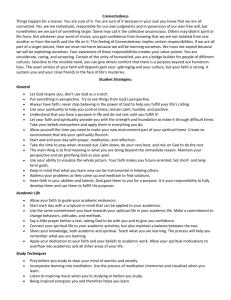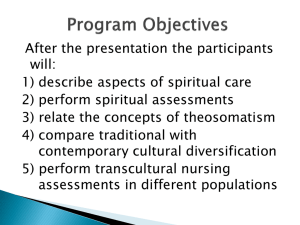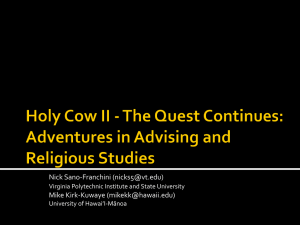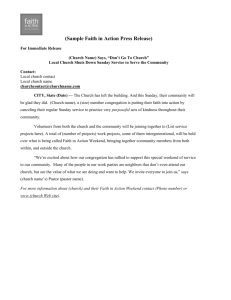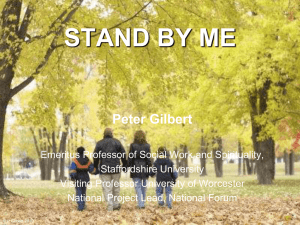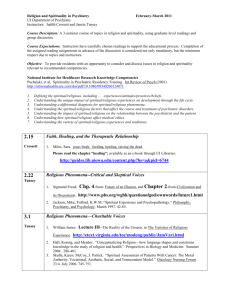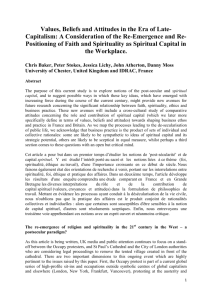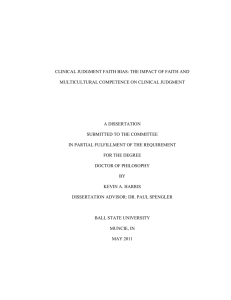Religion and Spirituality - Montclair Presbyterian Church
advertisement
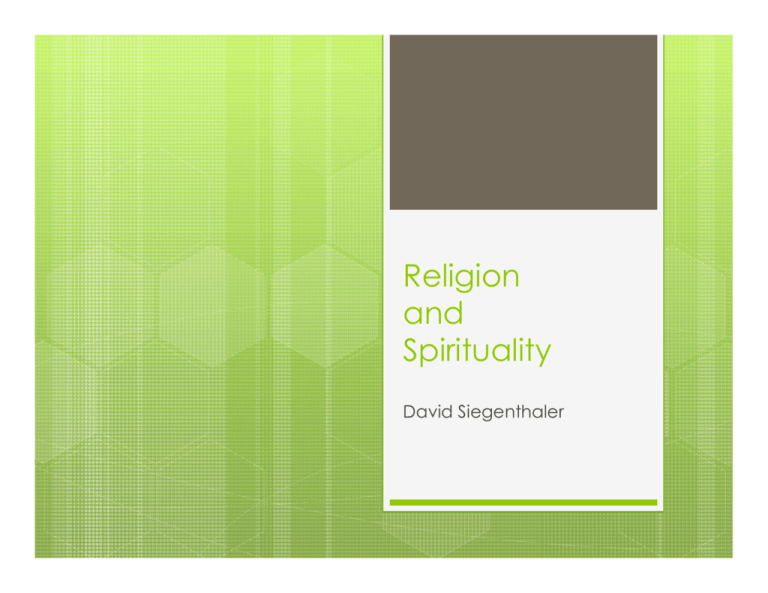
Religion and Spirituality David Siegenthaler Siegenthaler 6-3-2012 THINGS THAT STRUCK US AS SIGNIFICANT: Religious vs. Spiritual Are we religious – or are we spiritual? Religiosity and spirituality are not necessarily mutually exclusive, but there may be something of significance in MPC’s increased use of the term “spiritual.” (To follow Marge’s emphasis on celebration and music, we might also call this section “faith in a new key”) We found: MPCers do not want to be associated with fundamentalist or literalist Christianity. To be sure there is no mistake about how far separated we are from fundamentalism, some would prefer not to be perceived as too “religious”, and many would even prefer not to be too closely associated with the term “Christian”. To signify our distance from institutionalized Christianity and our openness to others, many of us prefer the term “spiritual” to “religious” o A majority do not believe that one religion has exclusive insight into God or the exclusive pathway to enlightenment; o We tend to want to embrace ecumenical and inter-faith partnerships. Using the term “spiritual” feels like a more encompassing term when in such settings, and the term “religious” tends to focus more on dogmatic positions. The phrases, “To be a place where diversity of faith and beliefs can seek community,” and “To be a unique connected diverse community of faith” came from one of the World Café discussions regarding our purpose. Some indications of our attitudes can be gleaned from the survey: o 80% said they are satisfied with the use of creeds or statements of faith during celebration. Since I know that we rarely (if ever) use creeds or statements of faith during the service, my conclusion is that many are satisfied with none. For those who think we use them too often (6.3%) I’m guessing their sense is that services are a bit too religious. The questions probably left room for widely varying interpretations. And it has been suggested that perhaps we are not used to religious terms, such as creeds and statements of faith. o 37% thought that the sermon does not need to be Biblically based or illustrated. o 67% said they would prefer a spiritual to a biblical emphasis. o Perhaps most astounding of all is that only 55% thought that it is essential that a pastor believe in God. 25% thought it would be important – but not essential. That leaves about 20% thinking it’s not even important…Dave will hit this point again in the section on what we want in our next pastor. Not to disparage these views – there are Strengths in them: 1 o A core value held by many at MPC is intellectual stimulation and the importance of questioning – questioning authorities (government, big business, financial institutions, institutionalized religion,) questioning the experience, conclusions, and attitudes of others (social and political assumptions). o MPCers place a high value on empirical methods and are inclined to trust good science rather than allow dogmatic positions to rule the conscience o Spirituality, for some – perhaps many, is a connection that also translates into action. Witness the congregation’s “spiritual activists”. But we think there may be some Dangers in all of this: o We are mindful of a history of injustices perpetrated in the name of religion. Our congregation has taken a stance against injustices we have known in our own denomination. Partly in our “yes” to affirming the God-given equality of all people. And partly in our saying a politically risky “no” to our denomination’s rules on the ordination of gay and lesbian people and to the prohibition on same-sex marriage. We wonder if this might have caused us to fixate on those differences to the neglect of tending to the underlying unity that has been the basis of our religious tradition. We may be doing too little to develop a commitment (however argumentative that may need to be) to solidarity with the Church. o Some of our findings indicate members lack knowledge of what it means to be Presbyterian, or of the Reformed tradition. We suspect our neglect of the education of the congregation has produced some of the apathy reflected in the surveys and in meetings regarding our religious heritage and connections. One way this came to expression was in our difficulty coming to agreement about whether or not it is because we are a church that we have been able to achieve the community that claims such solid devotion. We have a somewhat tenuous hold on the foundation of our existence as a church and as a faith-based community that needs to be strengthened if we care about the future survival of the church. o Our “yes” to inclusiveness is loud – yet the inclusiveness we practice and with which we are most comfortable is generally for like-minded people. This concern has been expressed by many of us. How this has changed since the 2006 mission study: o Many of our affirmations would be virtually the same ... o Our sense is that fewer members of the congregation have strong knowledge of the reformed Christian tradition. o Our distance from the denomination is greater – partly because of our own proclivities to rebellion and autonomy, partly due to the Presbytery’s changed understanding of its role - now more as a support body rather than as catalyst and stimulant (and maybe in part due to the internal polarities and conflicts that have eviscerated it), partly because the world (and us along with it) continues to grow more secular in its convictions and rejections, including the increased individualism in our society. Yet it is important to note that our denomination has changed due to the reforming commitments of Montclair and other “more light” congregations and individuals acting in concert. 2 There are plenty of opportunities alive within the congregation that bode well for our future if we will be willing to nurture them: o We are curious seekers who love to exercise the gift of reason and who are also seekers after truth and meaning – we might find some more meaning in our heritage and connections. o Our penchant for questioning authorities is “in solid” with the reforming tradition from which we come. o Our sensitivity to the plight and condition of others and our conviction that we need each other orients us differently in a world veering more and more toward individualism. o Our love of beauty and gratitude for life and living in community, and our affirmation of the larger community of all life, fit a community called to God’s service. There is a possible linkage to be noted here: the emphasis placed on the value of community, the notion mentioned in Marge’s summary of our congregational gatherings that “we experience the holy through our relationships”, and the emphasis on spirituality over that of religion. Perhaps no finer theological statement could be made than that we experience the holy through our relationships. Spirituality, for many, is a deep connection – a more profound experience than knowledge of a religion or attachment to dogma could possibly be. The question that arises from all of this is whether being “spiritual” adequately encompasses who we are and who we need to be. Or whether we should seek, in a deliberate way, to better understand the traditions, history, and stories of our past that can help us know the deep foundations of the community we experience today; - and that might help us express our faith in a new age. 3

